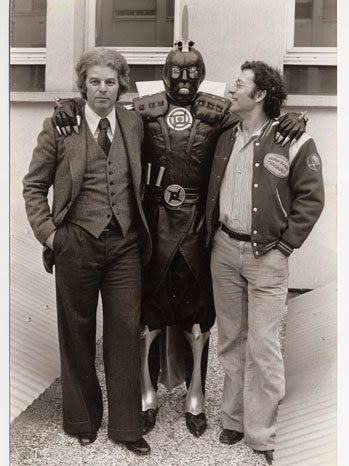Frank Herbert’s 1965 science fiction novel Dune is Moby Dick, The Lord of the Rings, and Citizen Kane all wrapped up into one book. It’s one of the great masterpieces of the genre, managing mythology, ecology, and adventure over the
course of hundreds and hundreds of pages. As vast and
sweeping as the novel is, you would think the story would be unfilmmable. But in reality, there was the bizzarely terrible 1984 David Lynch adaptation that starred a young Kyle MacLachlan and there was also the forgettable, made-for-tv syfy channel miniseries version in 2000 that starred, well, no one.
sweeping as the novel is, you would think the story would be unfilmmable. But in reality, there was the bizzarely terrible 1984 David Lynch adaptation that starred a young Kyle MacLachlan and there was also the forgettable, made-for-tv syfy channel miniseries version in 2000 that starred, well, no one.
But the most famous adaptation of the book is the one that was never made. That is the story told by Frank Pavich’s 2013 documentary Jodorowsky’s Dune now available on DVD. In 1973 Chilean director Alejandro Jodorowsky decided he wanted to film his version of the Moby Dick of sci fi. He had directed two other films already – El Topo and The Holy Mountain. Both were visionary, psychedelic, and stone-cold
weird. But they had amassed enough of a following to warrant giving him the reins of a bigger, more ambitious production.
In the documentary, Jodorowsky himself, now in his 80s, tells the entire story of his attempts to make this massive film. At the outset, he explains that his goal for the movie was nothing less than making something that would literally change the consciousness of all its viewers and ultimately lead to world peace.
Jodorowsky is charming and erudite, (shifting back and forth between Spanish and
heavily-accented English.) He grins enthusiastically and seems as excited by his plans for the film now as he must have been when he first started making them over forty years ago. As urbane and charismatic as he is, (throughout all the nicely-lit one-on-one interviews with him,) you’re never quite sure whether
or not he’s a little insane.
or not he’s a little insane.
If he is crazy, we learn it’s a fox-like craziness as he tells stories about convincing
Orson Welles to play the evil Baron Harkonnen by offering to hire the actor’s favorite chef from Paris to cater his every meal during production or getting surrealist painter Salvador Dali to play the emperor of the universe by agreeing to pay him a hundred thousand dollars per minute of screen time.
For the most part, Jodorowsky’s zeal is contagious and inspiring. You can see how his team
of producers, designers, and technicians easily felt as evangelical about the project as he did.
of producers, designers, and technicians easily felt as evangelical about the project as he did.
The only time the old director’s cheerful demeanor changes in the documentary is when he
describes how, after years of excruciatingly detailed planning and effort the project finally fell apart over commercial filmmaking’s most powerful factor – money. Jodorowsky snarls and curses that his world-changing masterpiece never got made because studios were afraid it wouldn’t make a profit.
describes how, after years of excruciatingly detailed planning and effort the project finally fell apart over commercial filmmaking’s most powerful factor – money. Jodorowsky snarls and curses that his world-changing masterpiece never got made because studios were afraid it wouldn’t make a profit.
The documentary features never before seen production art, designs, and interviews
with many of the original participants, including Jodorowsky’s son who trained in martial arts for two years as a teenager in preparation to play the lead role.
The film also does a good job of showing how influential Jodorowsky’s treatment of Dune
became in Hollywood. The five-inch thick book that had the entire film storyboarded shot for shot and included all the production designs for sets, costumes, vehicles, and characters circulated around all the major studios for years. Pavich draws direct visual correlations between Jodorowsky’s ideas and
designs and many of the sci fi blockbusters that came out in the decade following the project’s collapse. The documentary explicitly asks how different contemporary filmmaking would be today if Jodorowsky’s trippy, metaphysical, lofty Dune had been the first big commercial sci fi movie made in the 1970s instead of George Lucas’s pulpy blockbuster Star Wars.
designs and many of the sci fi blockbusters that came out in the decade following the project’s collapse. The documentary explicitly asks how different contemporary filmmaking would be today if Jodorowsky’s trippy, metaphysical, lofty Dune had been the first big commercial sci fi movie made in the 1970s instead of George Lucas’s pulpy blockbuster Star Wars.
The documentary Jodorowsky’s Dune is a fascinating first hand look at one of the
great “What If” stories of modern filmmaking. If you are a fan of behind the scenes stories, sci fi, or madmen chasing after white whales of their own making, you should definitely give it a look.
This review was originally broadcast on Q90.1, Delta College Public Radio. Learn more about the station at www.deltabroadcasting.org.



No comments:
Post a Comment